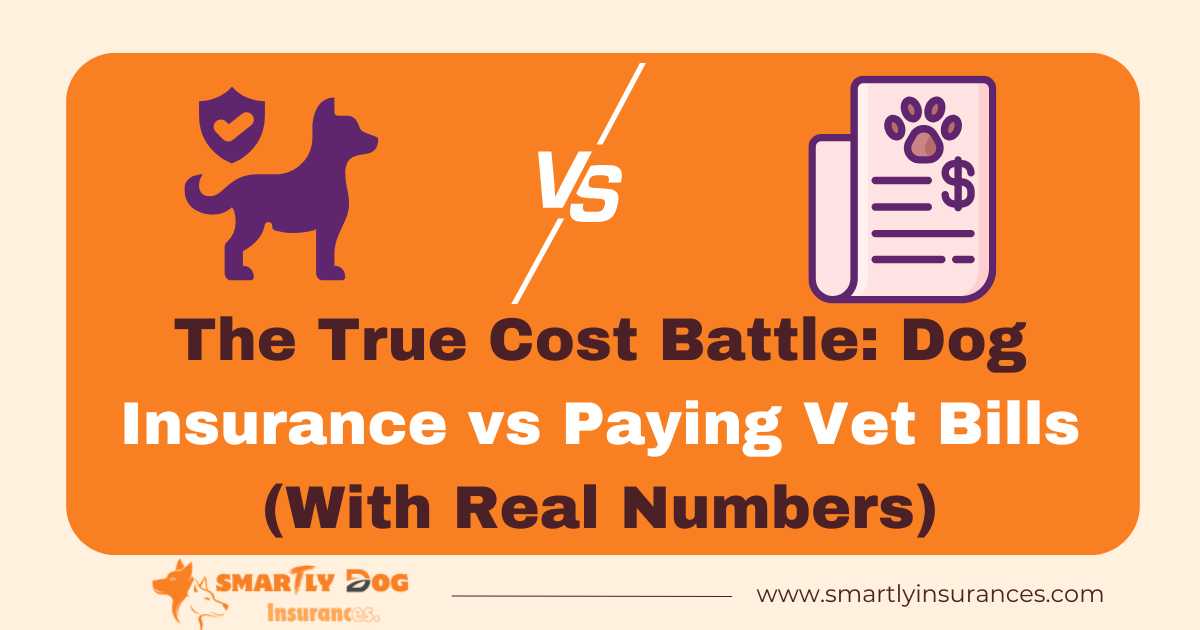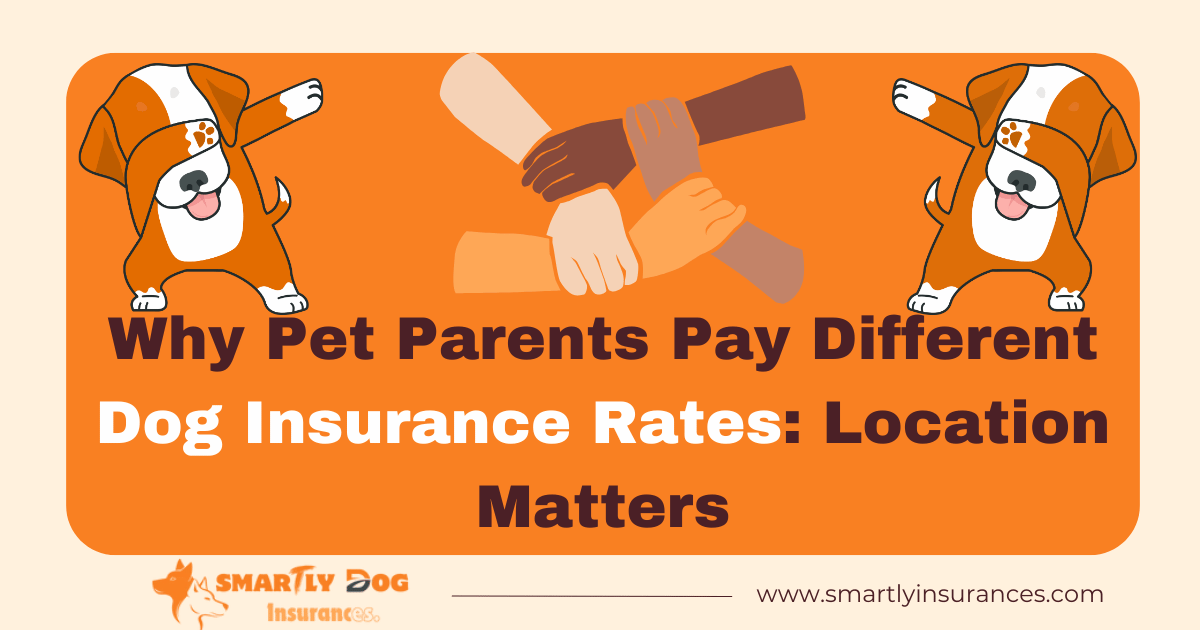Emergency vet care for dogs can cost anywhere from $250 to over $10,000. Pet owners face a significant decision between paying monthly insurance premiums or covering vet bills out of pocket. Dog insurance costs average $56.30 monthly, while one in three pets needs emergency treatment each year.
Ligament repairs can cost up to $7,000, and treating parvo disease in puppies might reach $8,000. Pet insurance covers 70% to 100% of these expenses after meeting your deductible. You need to weigh the benefits of pet insurance against self-funding your vet bills. We’ll help you understand the numbers and make an informed decision about your pet’s healthcare.
The true costs of both options deserve careful analysis. Our data from real-life scenarios will help determine the best financial choice for your situation.
Understanding Dog Insurance Costs in 2024
Dog insurance premiums now hit $56.30 per month on average in 2024. This change has reshaped the scene of pet insurance. Data from across the industry shows that pet owners pay about $17.07 monthly for accident-only coverage. This gives budget-minded pet owners a more affordable choice.
Average Monthly Premiums by Coverage Type
The price gap between different types of coverage remains substantial. Pet owners pay between $32 and $56 monthly for accident and illness coverage, which gives the most detailed protection. On top of that, accident-only plans cost around $204 per year. These plans give simple protection when unexpected injuries happen. Pet owners can add wellness coverage from $14 monthly. This extra coverage takes care of routine needs like vaccines and yearly checkups.
Factors That Impact Your Insurance Rate
Your monthly premium depends on several elements. Your dog’s age is a vital factor – older dogs cost more to insure because they face higher health risks. Breed type can substantially alter costs. Dogs prone to health issues like hip dysplasia or cruciate ligament tears need higher premiums.
Where you live makes a big difference too. Urban areas usually have higher rates because vet costs run higher there. The features you pick in your policy affect what you pay – a higher deductible brings down monthly costs. The amount insurers pay back, which runs from 70% to 90%, directly sets premium levels.
Male dogs usually cost a bit more because they tend to be more adventurous. So neutered dogs might get better rates since they show less aggressive behavior. The yearly coverage limits you choose, which range from $5,000 to unlimited, help determine your final premium.
Real Emergency Vet Costs Without Insurance
Pet owners can face serious financial stress from unexpected veterinary emergencies. A simple emergency exam for dogs costs between $96 and $236, though treatment expenses can climb much higher.
Common Emergency Procedures and Their Prices
Emergency care starts with simple diagnostic tests. Blood work costs range from $80 to $200. X-rays and ultrasounds cost between $150 and $600. We treated serious conditions that needed extensive care – emergency surgery runs between $2,000 and $5,000. Hospital stays add $222 to $567 per night.
These common emergencies come with specific price ranges:
- Gastroenteritis treatment: $250 to $3,750
- Broken bones: $1,875 to $6,250
- Severe trauma care: $2,500 to $12,500
Location-Based Cost Variations
Your location plays a big role in emergency vet costs. States like California and Hawaii, similar to Washington D.C., are the most expensive areas. The average annual vet costs in these regions exceed $1,400. Pet owners in North Dakota and Arkansas pay less, with annual averages of $769.
Payment Options When Uninsured
Pet owners without insurance have several ways to handle emergency costs. Emergency clinics need payment upfront, but you have flexible payment options. CareCredit provides interest-free financing for six to 24 months on purchases over $200. Scratchpay’s “Take 5” plan splits your bills into five biweekly payments without interest checks.
The Pet Fund and Brown Dog Foundation help with non-routine veterinary care. Some veterinary colleges run programs that offer financial aid to qualified pet owners. Personal loans or crowdfunding through platforms like GoFundMe are great ways to get immediate help.
Insurance vs Out-of-Pocket: 5-Year Cost Analysis
A five-year cost analysis between pet insurance and out-of-pocket expenses shows distinct financial outcomes in different health scenarios. Pet owners can determine the most economical option by examining this complete comparison.
Healthy Dog Scenario
Dogs with minimal health needs face insurance premiums of between $2,040 and $3,378 over five years for accident and illness coverage. Simple veterinary care costs range from $534 to $1,285 yearly for a healthy dog. Self-funding saves pet owners $1,500 to $3,000 over five years in these cases.
Dog with Chronic Condition
Money matters move dramatically when dogs develop chronic conditions. Dogs with diabetes, cancer, or arthritis need ongoing treatment. Pet owners might pay $6,500 in insurance premiums over five years. This coverage becomes valuable since chronic condition treatments cost more than $2,900 yearly. To cite an instance, cancer treatment costs range from $3,000 to $10,000 without insurance.
Emergency Surgery Scenario
Emergency situations present the most compelling case for insurance. One emergency surgery, like removing a foreign object, costs up to $5,000 without coverage. Pet owners pay just $1,200 with an 80% reimbursement policy after a $250 deductible. Treating conditions like bloat costs between $500 to $5,000 without insurance.
| Expense Type | Without Insurance (5 Years) | With Insurance (5 Years) |
|---|---|---|
| Healthy Dog | $2,670 – $6,425 | $6,500 – $23,500 |
| Chronic Condition | $14,500 – $30,000 | $7,900 – $25,000 |
| Emergency Surgery | $5,000 – $10,000 | $1,450 – $2,900 |
Major health issues show that insured pet owners save between $1,401 and $17,424 compared to out-of-pocket payments. Insurance becomes more valuable especially when you have dogs over ten years old who face higher cancer risks.
Breed-Specific Cost Comparison
Dog breeds shape insurance premiums and veterinary costs by a lot. Purebred dogs usually cost more to insure than mixed breeds.
Large Breed Insurance Rates vs Typical Vet Bills
Large breed dogs face high healthcare expenses throughout their lives. Mastiffs lead the insurance cost chart at $2,546 annually. We see this mainly because they tend to develop conditions like hip dysplasia and eye problems. German Shepherds and Rottweilers need higher premiums due to their likelihood of developing joint problems and heart conditions.
Studies show routine veterinary care for large breeds (55-85 pounds) costs $632 annually. Giant breeds (85+ pounds) need $705 yearly just for simple care. These prices reflect larger medication doses and more complex treatment procedures.
Research shows emergency surgeries for large breeds cost 30-50% more than similar procedures for smaller dogs. This difference comes from the need for extra anesthesia, bigger equipment, and more intensive post-operative care.
Small Breed Cost Considerations
Small breed insurance offers better financial value, with premiums 20-30% lower than large breeds. Chihuahuas and Maltipoos rank as the most affordable to insure. Their medical treatments need smaller medication doses and less complex procedures.
Small dogs’ yearly veterinary costs average $512. This makes them much more budget-friendly than larger breeds. Here’s how lifetime healthcare costs compare:
| Breed Size | Average Lifetime Cost | Life Expectancy |
|---|---|---|
| Small Dogs | $15,051 | 15 years |
| Medium Dogs | $15,782 | 13 years |
| Large Dogs | $14,480 | 10 years |
Small breeds often live longer and need extended periods of care. In spite of that, their overall medical expenses stay manageable. Their routine procedures cost 40-60% less than those for large breeds.
Making the Smart Financial Choice
Pet owners need to evaluate their financial situation and their dog’s specific needs to choose between pet insurance and self-funding. A solid healthcare strategy for your furry friend starts with understanding which option makes financial sense.
At the Time Insurance Makes Sense
Pet insurance is a great option for owners who want protection from unexpected vet bills. We found this coverage helps owners with young, healthy pets since policies won’t exclude future conditions. Insurance is vital if you can’t save more than $200 monthly, because a single emergency visit could drain your finances.
Insurance might be right for you if:
- Your dog’s breed has higher health risks
- You don’t have an emergency fund of at least $5,000
- You want the freedom to pursue advanced treatment options
Pet insurance gives you immediate coverage, while savings accounts take years to build up enough funds. Pet owners see big benefits from insurance with high-cost treatments that often cover between 70% to 100% of eligible expenses.
At the Time Self-Funding Works Better
A dedicated pet savings account can work well in certain situations. Self-funding ended up being the best choice for pet owners who:
- Can set aside large savings right away
- Have older pets with pre-existing conditions
- Have resilient emergency funds
Savings accounts let you use your money without dealing with claims or coverage limits. Owners of senior dogs often prefer self-funding since insurance costs rise sharply with age.
| Factor | Insurance Advantage | Self-Funding Advantage |
|---|---|---|
| Monthly Cost | Fixed premiums | Flexible contributions |
| Coverage Start | Immediate after waiting period | Depends on savings |
| Pre-existing Conditions | Not covered | No restrictions |
| Fund Control | Limited to eligible expenses | Complete flexibility |
Vet financing programs and medical credit cards can help if you choose self-funding. Some plans even offer interest-free periods up to 24 months. The Pet Fund and veterinary colleges run programs that provide financial help to qualified pet owners.
Comparison Table
| Aspect | Pet Insurance | Out-of-Pocket Payment |
|---|---|---|
| Average Monthly Cost | $56.30 | N/A |
| Accident-Only Coverage | $17.07/month ($204/year) | N/A |
| Emergency Exam Cost | 70-100% covered after deductible | $96-$236 |
| Emergency Surgery | $1,450-$2,900 (with 80% reimbursement) | $2,000-$5,000 |
| 5-Year Cost (Healthy Dog) | $6,500-$23,500 | $2,670-$6,425 |
| 5-Year Cost (Chronic Condition) | $7,900-$25,000 | $14,500-$30,000 |
| Cancer Treatment | 70-100% covered after deductible | $3,000-$10,000 |
| Payment Flexibility | Covers eligible expenses only | Complete flexibility |
| Pre-existing Conditions | Not covered | No restrictions |
| Payment Timing | Monthly premiums | Full payment upfront |
| Payment Options | Fixed premiums | CareCredit, Scratchpay, loans, crowdfunding |
| Best Suited For | – Young, healthy pets – Limited monthly savings – High-risk breeds | – Strong emergency funds – Older pets with pre-existing conditions – Good savings ability |
Pet owners face a clear choice between insurance and out-of-pocket payments for their furry friends. Young, healthy dogs and breeds with known health issues benefit most from pet insurance. Monthly premiums make financial sense when they help offset emergency costs that can range from $2,000 to $10,000.
Medical procedures for large breeds cost 30-50% more than smaller breeds, which makes the decision even more critical for their owners. Pet insurance averages $56.30 per month, but this investment could save owners between $1,401 and $17,424 during major health emergencies.
Pet owners with substantial savings and older dogs that have pre-existing conditions might prefer self-funding. Each owner’s situation differs based on their monthly savings ability, dog’s breed, age, and comfort level with risk. These factors shape the final decision.
Real-life cost analysis shows that both options have their merits. The best choice depends on your financial situation, capabilities, and your dog’s health profile. Smart pet owners should assess their budget limits and long-term healthcare needs before choosing a path that works for them.



